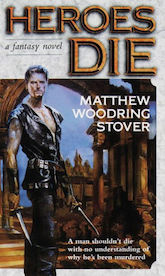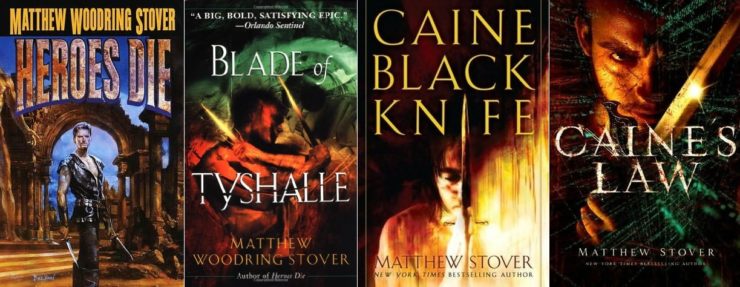Matthew Stover is perhaps best known for his work in the Star Wars Expanded Universe—and for good reason. His novelization of Revenge of the Sith brings a depth and emotion to Anakin’s relationships with Obi-Wan and Padmé that the movie could only wish to achieve. His installment in the New Jedi Order sequence, Traitor, is possibly the best-written, finest single novel in the entire Expanded Universe.
But it is Stover’s Acts of Caine quartet that has achieved cult classic status and represents his best work. He brings the same level of characterization, the same depth to his portrayal of relationships, the same emotion that he did in his Star Wars novels—but he wraps it up in an even richer world built upon deep and layered themes, fantastic action sequences, and one of the strongest voices in the science fiction and fantasy genres.
All of this is possible because of Caine. Caine is the seminal hero—or, perhaps, anti-hero, as Stover’s quartet really hits all the marks of the grimdark subgenre.
Caine is an ultimate badass, a fantastic fighter, ruthless, remarkably uncouth and forthright in his vocabulary. But what drives him is something that many other grimdark series miss out on, and that is his familial relationships, both by blood and adopted.
Buy the Book


Heroes Die
Hari Kapur Michaelson is one of Earth’s Top Ten Actors, hundreds of years in the future. He commands a staggering audience, both among the common people in Earth’s rigid caste system and the über-rich, the Businessmen and Leisurefolk who really run the world. Because he has this clout as an entertainer, he’s given more freedom than a standard Laborer or Professional would normally expect.
But despite that, Hari’s still extremely limited: it is a caste system. He is under the ruthless thumb of the Board of Governors of Adventures Unlimited; he has to deal with petty functionaries, like his boss, Arturo Kollberg; and he struggles with those constraints.
On Overworld, the alternate dimension of Earth where elves and magic and dragons are real, Hari is known as Caine: an assassin and fighter of renown. His estranged ex-wife, Shanna Leighton, is also an actress: known as Pallas Ril, she is a mage on Overworld.
When Shanna goes missing in the midst of an Adventure, and her link back to her audience on Earth is severed, the Studio sees an opportunity to kill two birds with one stone. The current God-Emperor of Ankhana on Overworld, Ma’elKoth, is inconvenient for the Studio and the Board, because he is an inextricable part of any Adventure in Ankhana—but he’s propagating ideas that run counter to the current government on Earth. The Board cannot afford to have the “unwashed masses” of Laborers and Professionals and Artisans get these ideas in their heads and become aware of the injustices being visited upon them.
So of course, they attempt to dangle the opportunity to rescue Pallas Ril as the carrot to convince Caine to agree to assassinate Ma’elKoth. Unfortunately for them, Caine doesn’t like the deal—and Pallas has opinions of her own about her ex-husband coming to town.
Unlike Shanna, Hari misses their marriage. He sees this situation as an opportunity to get back together, but he grates at the Studio’s demand that he kill Ma’elKoth before he can bring Shanna back. In short, he just wants to get the job done and reunite with his wife; the Studio wants a blockbuster hit that may or may not get Caine killed in the process.
Further complicating things is the presence of Hari’s father: Duncan Michaelson is a disgraced former professor, reduced in caste for speaking out against injustice, and subsequently stricken with an incurable neuro-degenerative disorder. During his episodes throughout Hari’s childhood, Duncan would frequently beat him. Worse, one occasion resulted in the death of Hari’s mother.
Duncan and Hari maintain a tenuous relationship, with Duncan hoping to impress his values upon Hari during his rare lucid moments. Hari, meanwhile, is torn between loathing for his father’s abuses and a fierce desire to retain contact with his final remaining family member.
So, while Hari is assigned this (presumably) final Adventure as Caine, he finds time to visit his father in the state-run penitentiary. Their conversations shed light on the true character of both Caine and Hari—because despite being the same person, they are very different personas.
It is in this way that Stover develops one of the richest characters in science fiction (or fantasy, or whatever genre you want to call this). Hari/Caine is so much more than one simple man: he is larger than life, taking on literal religious and mythical significance on Overworld while being a symbol of resistance for the downtrodden back on Earth. Through his relationships with his father and his ex-wife, these aspects of him are explored, strained to their limits, and often subverted.
Matthew Stover doesn’t keep things simple in Heroes Die, and the result is a bombastic, action-packed adventure story—but filled with plenty of social criticism and literary themes to dig into.
Drew McCaffrey lives in Fort Collins, CO, where he is spoiled by all the amazing craft beer. You can find him on Twitter, talking about books and writing, but mostly just getting worked up about the New York Rangers.










